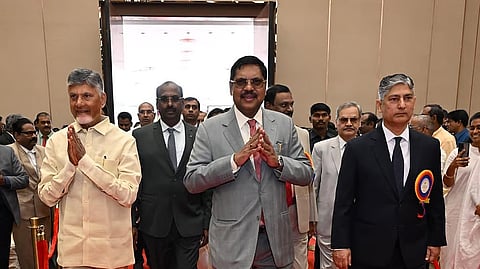

VIJAYAWADA: Chief Justice of India Bhushan Ramkrishna Gavai emphasised that the Indian Constitution was deliberately designed as a ‘living document’, capable of evolving with changing times, and societal needs.
The CJI delivered the keynote address at a special programme ‘India and the Living Indian Constitution at 75 Years’ organised by the Andhra Pradesh High Court Advocates’ Association in Mangalagiri on Sunday.
The CJI said Article 368 was incorporated precisely to allow amendments, and ensure the Constitution remains dynamic rather than rigid.
The principles of justice, liberty, equality and fraternity enshrined in the Constitution, empower every citizen.
“It is because of these fundamental rights that a tea seller like Narendra Modi could become the Prime Minister, and I, coming from a remote region of Maharashtra, could rise to become the Chief Justice of India, and N Chandrababu Naidu could become the Chief Minister of Andhra Pradesh,” he said.
Calling it a coincidence that both his birthplace, and his last public event as the CJI happened to be in ‘Amaravati’, Justice Gavai highlighted the Directive Principles, which aim to ensure social and economic justice. “Every citizen has the right to approach court if his fundamental rights are violated,” he said.
The CJI mentioned that the first Constitutional amendment related to reservations, stemmed from early conflicts. Referring to the Supreme Court’s landmark Kesavananda Bharati judgment, he said the case had established the basic structure, which ensures core constitutional principles are not amended.
CJI Gavai’s judgments are benchmarks, says Naidu
The CJI reiterated that while the Constitution is flexible enough to adapt to social and economic needs, amendments concerning the judiciary, federal structure, and other democratic institutions should remain stringent.
Andhra Pradesh High Court Chief Justice Dhiraj Singh Thakur recalled the 1946 resolution of the Constituent Assembly, which laid the foundation for an independent sovereign republic ensuring social and economic equality. He noted that the Constitution, with 395 Articles, 22 parts and eight schedules, emerged as one of the world’s most comprehensive democratic documents.
“The Indian Constitution has undergone 106 amendments so far, from the first amendment to landmark cases like Shankari Prasad, Golaknath, Kesavananda Bharati and SR Bommai,” he explained.
Naidu hailed Justice Gavai as a humanitarian who upheld equality in both thought and action. “The CJI’s judgments will remain benchmarks for future generations,” he said.
Naidu highlighted the significance of Justice Gavai’s roots in Amravati (Maharashtra) and his last public event as the CJI being held in Amaravati (Andhra Pradesh).
He stressed that democracy is safeguarded when the judiciary ensures checks and balances.
He outlined his vision for eliminating social and economic inequalities, and building a healthy, wealthy and happy society.
“Our country rose from the 11th to the fourth largest global economy since 2014, and is poised to become the second largest by 2038, and the largest by 2047,” he emphasised.
Advocate General Dammalapati Srinivas, Deputy Solicitor General Ponnarao, Guntur District Judge B Sai Kalyana Chakravarthy, and several legal luminaries were present.
